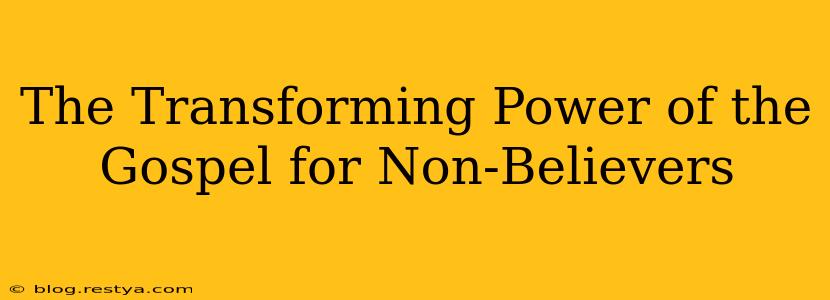The wind whipped around Elias, carrying the scent of salt and the cries of gulls. He stood on the cliff edge, the vast, indifferent ocean mirroring the emptiness in his heart. He’d tried everything – chasing success, seeking pleasure, building a life that looked perfect from the outside – but the hollowness remained. He felt adrift, a ship without a sail, tossed by the relentless waves of life’s uncertainties. Then, a friend mentioned the Gospel, a word that had always seemed distant, irrelevant. But his desperation pushed him to listen. What he discovered changed everything.
This is not a story about instant miracles or dramatic conversions (though those do happen). This is a story about a gradual unfolding, a quiet revolution of the heart that began with a simple question: What if? What if this message of hope, often dismissed as naive or outdated, held a profound truth?
What is the Gospel, and Why Should I Care?
The Gospel, at its core, is the good news of Jesus Christ. It’s the message that God, in his boundless love, sent his Son to die for the sins of humanity, offering a path to reconciliation and a new life. For many non-believers, this sounds overly simplistic, even fantastical. But the Gospel’s power lies not in magical thinking, but in its profound implications for the human condition. It addresses the fundamental struggles we all face: guilt, shame, fear, loneliness, and the ultimate fear of death.
How Does the Gospel Address My Doubts and Fears?
Many approach the Gospel with skepticism, fueled by a myriad of doubts and fears. It's perfectly normal to question religious claims. Faith isn't about blindly accepting dogma; it's about seeking truth and allowing yourself to be open to possibilities that may challenge your existing worldview.
What if the Gospel is just a myth?
The Gospel’s claim isn't merely about a moral code; it’s about a historical figure, Jesus Christ, whose life, death, and resurrection are documented across multiple sources, though interpretations vary. Exploring these historical accounts, engaging with scholarly discussions, and considering the impact of Jesus’ teachings on individuals and societies can help address these doubts. Ultimately, faith involves a personal journey of investigation and reflection.
Isn't the Gospel judgmental and intolerant?
The Gospel's message is often misconstrued. It emphasizes love, forgiveness, and grace, not condemnation. The emphasis on personal transformation and the pursuit of a loving relationship with God isn’t about imposing rules, but about a change of heart – a profound shift in perspective that impacts how we treat ourselves and others.
How can the Gospel help me in my daily life?
The transformative power of the Gospel unfolds gradually. It provides a framework for understanding life's challenges, fostering inner peace, resilience, and purpose. It offers a community of support and encourages acts of love and service. Through prayer and reflection, individuals discover new strength to face adversity and live with greater integrity.
What are the benefits of accepting the Gospel?
For Elias, accepting the Gospel wasn't a sudden conversion but a slow, deliberate journey. He found solace in the message of forgiveness, a release from the weight of his past mistakes. He discovered a sense of purpose, a reason to live beyond himself, and a community that offered unwavering support during challenging times. The transformation wasn't about abandoning his intellect or critical thinking; it was about integrating faith into his life, enriching rather than replacing his understanding of the world.
The Gospel's power lies in its ability to address the deepest longings of the human heart – the yearning for love, belonging, purpose, and hope. It's an invitation to embark on a journey of self-discovery and transformation, a journey that can lead to a life filled with meaning, joy, and lasting peace. Just like Elias, you might find that the greatest adventure lies in exploring a possibility you once dismissed.

